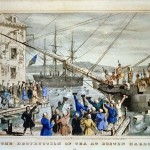
Over at First Thoughts, there is a post titled, “The Lecture Works, and It Always Has.” Although it oversimplifies the issue, it does a good job of bluntly stating the obvious fact that there is something about the art of lecturing that will not soon go away.
I think lectures will endure in human life — they are highly effective ways of communicating, and can be quite beautiful and transformative — but they may be banned from many of our colleges and universities someday. There are many experts out there, especially those who claim to be interested in “instructional development” and alike, who believe that the lecture is morally offensive, a “sage on the stage” bulling pupils into blind submission and boredom.
There is some truth to this caricature. I’ve always said that the only bad lecture is a bad lecture, and there are few things more mind numbing and soul crushing than a really bad, abusive lecture. And, of course, there are hybrid forms of lecturing, too. Even a discussion seminar can quickly transform into a mini-lecture — for better or worst.
The real issue here is not about lecturing outright. It is about a much deeper and more serious set of questions: Should professors profess? Should teachers teach through the art of profession? Do we want sages, priests, parsons, rabbis, oracles, prophets, presidents, elders, preachers, ministers, statesmen, and the rest?
Make no mistake: those who’s worldview finds lecturing morally offensive are not out to kill the lecture; they are out to kill the lecturer.
Thankfully, these people are usually dimwits and fail to realize that they lecture at great length about not lecturing. So don’t be scared and don’t take them seriously. They subvert their own ends by professing about not professing.
*
This is not limited to the Academy.
This extends to all teachers, in and out of schools.
To parents and workers and friends.
*
Jesus was a rabbi, a teacher. When he taught, scripture tells us, he usually sat down.
Stephen Webb reminded us last week, at First Things, that Jesus was sensitive to the acoustics of teaching: he preached from a boat because sounds carries better over water. This shows the craft of the lecture, and the need to be aware of the acoustics of the oral profession. It also unites the art of homiletics to the performance arts that work in sound. Music, rhetoric, theatre, teaching.
Even Socrates, Plato tells us, often used the monologue in the midst of his dialogues. There is nothing Socratic about a discussion where there is no teacher.
Today is the anniversary of the Gettysburg Address.
*
If teaching is an art, then, the teacher must have something to show and offer.
Not all teachers profess through their words. I believe there is room for the silent lecturer, the exemplar. But there is a longstanding tradition in human life to listen to (or read) the words of a professor, one who offers a profession of faith and reason and imagination.
Stories.
The result may not be learning or even the transfer of knowledge. This is the gravest mistake of the those who attach teaching to learning, as though the professor’s vocation is to shovel practical facts and trivia into people’s head. The art of teaching may lead to unlearning or even to confusion and aporia — even the terrible lecture can teach us something.
In the end, the teacher is not there to facilitate learning, the teacher is there to be there. The homilist takes his place, and dwells, reminding us that Christ came not to leave us with instructional updates, he came to dwell amongst us. Jesus wept. Teaching cannot end with pedagogy, it must lead further and deeper into mystagogy.
*
A mentor of mine studied in Rome under the great theologian, Bernard Lonergan. He told me of the day that Professor Lonergan entered the room, a sage indeed, and proceeded to give what would be his best lecture of the semester.
Lonergan spoke five words. “We are undone by love.”
Deeply moved and unable to add to that, the class ended.










